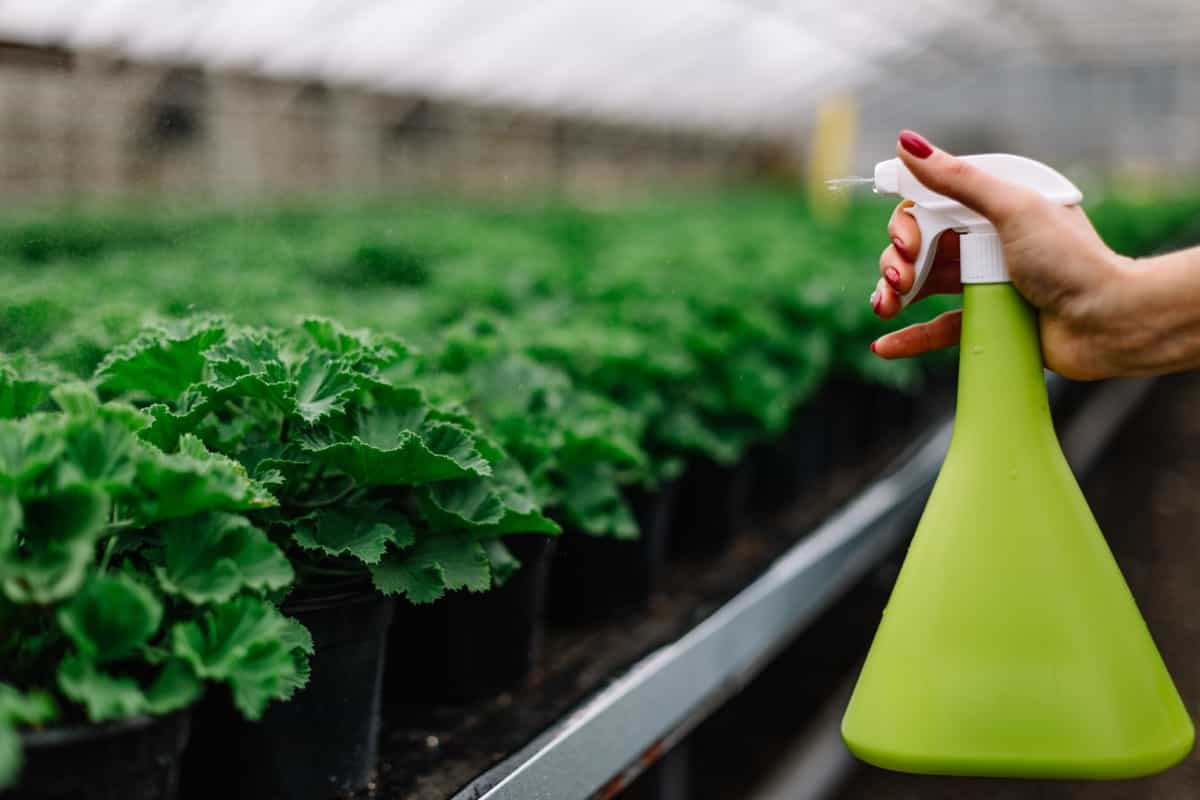In the realm of horticulture, combating plant pests is a common challenge. This blog delves into effective strategies for pest control, focusing on homemade natural and organic remedies to thwart fungal diseases. Unearth simple yet potent solutions to nurture your plants without chemical interventions. Join us on a journey to cultivate a healthier, thriving garden as we explore accessible techniques rooted in nature’s bounty.

How to Control Common Plant Pests
Identifying and Controlling Garden Pests Naturally
Garden pests can threaten your green haven, but identifying and controlling them can be manageable. Start familiarizing yourself with common culprits like aphids, caterpillars, and mites. Utilize natural deterrents such as companion planting—strategically placing plants that repel pests near vulnerable ones. Introduce beneficial insects like ladybugs and parasitic wasps to maintain a natural ecological balance. Employing neem oil or garlic spray can act as an organic repellent, discouraging pests without harming plants. Regularly inspecting your garden allows early detection of infestations, enabling swift intervention.
Best Natural Remedies for Aphid Control in Your Garden
Aphids are small, soft-bodied insects that damage plants, causing damage to leaves, stems, and flowers. To control aphids naturally, spray them with water, use dish soap or neem oil to disrupt their protective coating, and grow aphid-repellent plants like garlic, onion, marigold, nasturtium, lavender, oregano, and ginger. Planting these plants, among others, can help deter aphids from attacking them.
Attracting beneficial insects like ladybugs, lacewings, hoverflies, and parasitic wasps to your garden can also help. Plant flowers that provide nectar and pollen, such as yarrow, dill, fennel, cosmos, and sunflower, or buy ladybugs or lacewings from garden centers and release them in your garden.
Best Organic Solutions for Eliminating Whiteflies from Your Plants
Whiteflies are small white insects that feed on plant sap and produce sticky honeydew, attracting other pests and diseases. They can infest various plants, especially in warm climates where they can survive winter. To eliminate whiteflies organically, use neem oil spray, vacuuming, soap and water, sticky traps, and natural predators. Neem oil spray repels and kills whiteflies by mixing neem oil with organic liquid soap and water.
In case you missed it: 14 Natural Ways to Treat Fruit Rot: Organic Homemade Recipes for Preventing Fruit Rot

Vacuuming removes whiteflies from under leaves and plant stems, while soap and water create a homemade whitefly spray. Sticky traps attract and trap whiteflies by immobilizing them and dying on them. Natural predators like ladybugs, dragonflies, garden spiders, green lacewing larvae, and parasitic wasps can also help reduce whitefly populations. These organic solutions are safe, effective, and environmentally friendly, ensuring healthy plants.
Best Homemade Sprays to Combat Caterpillar Infestations in Your Garden
Caterpillars, the complete larval stage of butterflies and moths, can cause severe damage to plants by chewing on their leaves. Several homemade sprays can combat caterpillar infestations without harming the environment or your health. One such spray is pepper spray, made from fresh peppers, garlic, water, and soap. This spray irritates caterpillars’ skin and digestive system, causing them to leave your plants alone. Another spray is molasses and dish soap, made from molasses, dish soap, and water.
This spray attracts beneficial insects that prey on caterpillars and makes leaves sticky and unpleasant for them to eat. Lastly, Bacillus thuringiensis (BT) spray, made from a naturally occurring bacteria in the soil, infects caterpillars’ digestive system and kills them within a few days. This spray is safe for humans, pets, and other animals and can be used twice: once ten days after caterpillar eggs have hatched and again two weeks later.
Managing Mealybugs with Organic Methods in Your Garden
Mealybugs are soft-bodied insects feed on plant sap and produce honeydew, damaging ornamental and edible plants. To control them organically, remove infested leaves and branches, spray plants with water, and wipe them with a cotton swab dipped on rubbing alcohol.
In case you missed it: Easy Homemade Recipes for Garden Plants: Natural and Organic Fertilizer for Vegetables, Flowers, and Houseplants

Attract natural predators like ladybugs, lacewings, and parasitic wasps by planting nectar-rich flowers. Apply neem oil spray to plants to repel and kill mealybugs, as it is a natural insecticide that doesn’t harm beneficial insects or pollinators. A homemade garlic, onion, chili powder, and water spray can also deter mealybugs due to its strong odor and taste.
Effective Ways to Control Spider Mites Naturally in Your Plants
Spider mites are tiny arachnids that suck juice from plant cells, causing yellowing, stippling, or bronzing of leaves and spinning fine webs. They can infest indoor and outdoor plants and cause significant damage if left untreated. To control spider mites naturally, remove infested leaves and stems, hose plants with water, spray with soap and water solution or insecticidal soap, and apply lemon juice spray.
Introduce natural predators like ladybugs, lacewings, predatory mites, or minute pirate bugs to your garden or greenhouse to reduce their population. Finally, sprinkle diatomaceous earth on the soil and around plants to dehydrate and kill spider mites. These methods help prevent the spread of mites and ensure the health of your plants.
Natural Techniques for Dealing with Snail and Slug Infestations in the Garden
Snails and slugs are common pests that damage plants, leaving unsightly holes and slime trails. To deal with these infestations in an eco-friendly way, try using natural techniques such as handpicking, setting traps, creating an unfavorable habitat, and putting up barriers. Handpicking involves collecting snails and slugs and disposing of them in soapy water. Traps can be set near infested plants and checked regularly.
Improving drainage, removing debris, trimming tall grass, and mulching with coarse materials can make the garden less attractive to these pests. Barriers can be created using copper tape, diatomaceous earth, salt, or wood ash, which irritate their skin and prevent them from crossing over. Growing plants resistant to snail and slug damage, such as lavender, rosemary, sage, mint, geranium, begonia, and fuchsia, can also help.
DIY Solutions for Eliminating Thrips from Your Plants
Thrips are tiny insects that cause plants to lose color, wilt, curl, or develop spots. They can also transmit viral diseases that can kill plants. To eliminate thrips, you can use DIY solutions such as washing them off with water, pruning off infested parts, applying insecticidal soap or neem oil, using blue sticky traps, and encouraging natural predators.
In case you missed it: Homemade Soap-Based Insecticides for Garden Pest Control

Wash the plants with water every few days until no signs of thrips are seen. Prune off infested parts and spray insecticidal soap, neem oil every 7 to 10 days until the thrips are gone. Use blue sticky traps to monitor, trap thrips, change them when full of thrips, and encourage natural predators like ladybugs, lacewings, predatory mites, and pirate bugs to control their numbers. Planting flowers like marigolds, sunflowers, daisies, and yarrows can also help attract these predators to your garden.
Best Organic Approaches to Combating Scale Insects in Your Garden
Scale insects can cause damage to gardens, but there are natural solutions. Introduce natural predators like ladybugs and lacewings, use horticultural oils like neem oil as deterrents, and create homemade insecticidal soap. Spray this on affected plants, suffocating the insects. Regular pruning and removal of infested parts also help reduce their spread.
Best Homemade Remedies for Controlling Japanese Beetles in Your Garden
Japanese beetles are a persistent threat but can be managed with homemade remedies. Set up beetle traps with soapy water, plant beetle-resistant species like garlic, chives, or marigolds, use a DIY spray with garlic and hot pepper, or use neem oil for insect-repelling properties. Rotate crops to disrupt their life cycle and reduce the likelihood of infestation.
Managing Ant Infestations in the Garden Using Natural Methods
Ants can invade gardens, but natural methods can help. Seal entry points with cinnamon, coffee grounds, or diatomaceous earth. Introduce natural predators like nematodes or predatory insects. Keep the garden clean and free of food debris. Use a DIY ant-repelling spray by mixing water, vinegar, and citrus peels in ant-prone areas.
Best Organic Solutions for Dealing with Earwigs in Your Plants
Earwigs can be managed using organic solutions such as hiding spots, sprinkling diatomaceous earth around plants, using vegetable oil and soy sauce as traps, and using neem oil as a deterrent. Regular garden cleanup helps remove potential hiding spots and discourages earwig infestations. These organic solutions can help maintain a healthy and pest-free environment for your plants.
Best Homemade Sprays to Combat Grasshopper Infestations in Your Garden
Grasshoppers are common harmful insects that feed on garden plants and field crops. Homemade sprays made from garlic, vinegar, or diatomaceous earth can be used to repel them. You can make garlic spray by blending garlic bulbs with water, letting them sit overnight, and then diluting with water. Vinegar spray can be made by mixing vinegar with water and a few drops of liquid soap, and diatomaceous earth spray can be made by mixing four tablespoons of diatomaceous earth with water and a few drops of liquid soap.
In case you missed it: Best Fertilizer for Tinda: Organic, Natural, Homemade, NPK Ratio, When and How to Apply

Natural Techniques for Controlling Fungus Gnats in Your Plants
Fungus gnats are small, dark flies that infest indoor houseplants, damaging roots and stunting plant growth. To control them, let the soil dry between waterings, use sticky traps to catch adult gnats, and apply Bacillus thuringiensis israelensis (Bti) or beneficial nematodes to kill larvae. These natural methods discourage egg laying and kill larvae, ensuring healthy indoor plants.
DIY Solutions for Eliminating Leaf Miners from Your Garden
Leaf miners are insects that lay their eggs inside plant leaves, causing tunnels or blotches that reduce photosynthesis and plant aesthetic value. You can attract or release natural enemies like ladybugs, lacewings, parasitic wasps, soldier beetles, and predatory bugs to eliminate leaf miners. A homemade hot pepper spray can be made by blending hot peppers, onion, and garlic in water, then straining and adding organic liquid soap.
Neem oil, a natural pesticide derived from a tropical tree, can control leaf miners by mixing two tablespoons of neem oil with of water. Row covers lightweight fabrics can protect young plants from leaf miners by allowing light and air to pass through, preventing adult flies from laying eggs on the plants. These DIY solutions can help eliminate leaf miners from your garden.
Best Organic Approaches to Combatting Vine Weevil Infestations in Your Plants
Vine weevils are beetles that feed on plants, particularly those grown in pots. Adults chew notches on leaf edges, while larvae eat roots, causing wilting and plant death. You can use handpicking, pesticides, traps, and nematodes to combat vine weevil infestations. Handpicking involves inspecting plants at night with a flashlight or shaking them over a newspaper to reduce the number of eggs in the soil.
Pesticides, such as imidacloprid, are absorbed by plants and kill both adults and larvae. Traps, like sticky or pitfall traps, attract and kill adult weevils using colored strips or containers filled with water or beer. Nematodes, microscopic worms that parasitize and kill larvae, can be used as biological control. Nematodes are mixed with water and poured onto the soil when larvae are active, with the soil temperature above 50°F for them to work.
Best Homemade Remedies for Controlling Rosemary Beetles in Your Garden
Rosemary beetles are shiny insects that feed on the leaves and flowers of aromatic plants, causing damage and reducing their quality. You can use homemade remedies such as handpicking, insecticidal soap, neem oil, and horticultural oil to control these pests. Handpicking is eco-friendly, especially in late summer and spring when beetles are most active. Insecticidal soap can be made by mixing liquid soap with water, spraying it on affected plants, and repeating the treatment every few days until no more signs of infestation are seen.
In case you missed it: Best Fertilizer for Indian Gooseberry/Amla: Organic, Homemade, NPK Ratio, When and How to Apply

Neem oil, a natural insecticide containing azadirachtin, can be purchased from garden centers or made by soaking neem seeds in water. Horticultural oil, which can suffocate and kill rosemary beetles and larvae, can be used by mixing vegetable, mineral, or horticultural oil with water and a few drops of liquid soap. Applying this oil every 10 to 14 days until the infestation is under control is recommended. These homemade remedies are effective and safe for plants and the environment, but patience and persistence are required.
Conclusion
Embrace the power of nature in safeguarding your garden. You fend off common plant pests and foster a healthier, eco-friendly environment by employing homemade natural remedies and organic approaches. Let your garden thrive with the simplicity and effectiveness of these preventative measures.
- How to Build a Low-budget Goat Shed: Cheap Ideas and Tips
- Goat Farming Training Programs in India: A Beginner’s Guide
- Types of Pesticides Used in Agriculture: A Beginner’s Guide
- Economical Aquaculture: A Guide to Low-Budget Fish Farming
- 15 Common Planting Errors That Can Doom Your Fruit Trees
- How to Make Houseplants Bushy: Effective Tips and Ideas
- Innovative Strategies for Boosting Coconut Pollination and Yield
- Pollination Strategies for Maximum Pumpkin Yield
- The Complete Guide to Chicken Fattening: Strategies for Maximum Growth
- Natural Solutions for Tulip Problems: 100% Effective Remedies for Leaf and Bulb-Related Issues
- Revolutionizing Citrus Preservation: Towards a Healthier, Greener Future
- Natural Solutions for Peony Leaf and Flower Problems: 100% Effective Remedies
- Maximizing Profits with Avocado Contract Farming in India: A Comprehensive Guide
- Natural Solutions for Hydrangea Problems: 100% Effective Remedies for Leaf and Flowers
- The Ultimate Guide to Choosing the Perfect Foliage Friend: Bringing Life Indoors
- From Sunlight to Sustainability: 15 Ways to Use Solar Technology in Agriculture
- The Ultimate Guide to Dong Tao Chicken: Exploring from History to Raising
- The Eco-Friendly Makeover: How to Convert Your Unused Swimming Pool into a Fish Pond
- Mastering the Art of Delaware Chicken Farming: Essentials for Healthy Backyard Flocks
- 20 Best Homemade Fertilizers for Money Plant: DIY Recipes and Application Methods
- How to Craft a Comprehensive Free-Range Chicken Farming Business Plan
- Brighten Your Flock: Raising Easter Egger Chickens for Beauty and Bounty
- How to Optimize Your Poultry Egg Farm Business Plan with These Strategies
- Subsidy for Spirulina Cultivation: How Indian Government Schemes Encouraging Spirulina Farmers
- Ultimate Guide to Raising Dominique Chickens: Breeding, Feeding, Egg-Production, and Care
- Mastering the Art of Raising Jersey Giant Chickens: Care, Feeding, and More
- Ultimate Guide to Raising Legbar Chickens: Breeding, Farming Practices, Diet, Egg-Production
- How to Raise Welsummer Chickens: A Comprehensive Guide for Beginners
- How to Protect Indoor Plants in Winter: A Comprehensive Guide
- Ultimate Guide to Grow Bag Gardening: Tips, Tricks, and Planting Ideas for Urban Gardeners
- Guide to Lotus Cultivation: How to Propagate, Plant, Grow, Care, Cost, and Profit
- Agriculture Drone Subsidy Scheme: Government Kisan Subsidy, License, and How to Apply Online
- Ultimate Guide to Raising Araucana Chickens: Breed Profile, Farming Economics, Diet, and Care
- Bringing Hydroponics to Classroom: Importance, Benefits of Learning for School Students
- Ultimate Guide to Raising Polish Chickens: Breed Profile, Farming Economics, Diet, and Care
- Ultimate Guide to Raising Australorp Chickens: Profile, Farming Economics, Egg Production, Diet, and Care